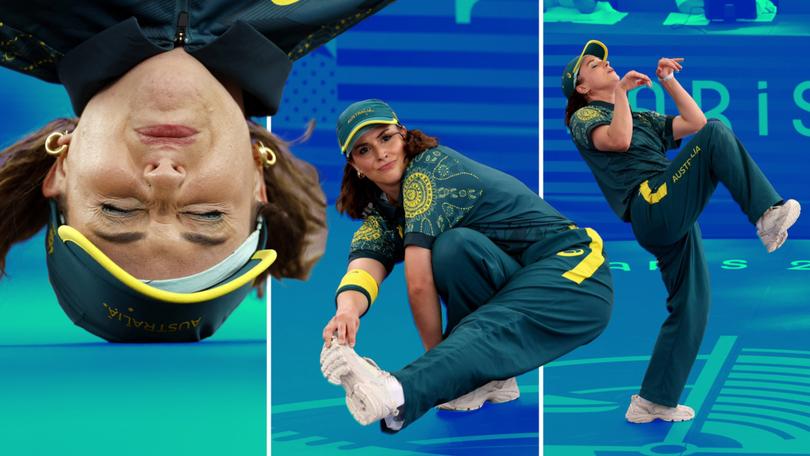JENI O’DOWD: Rachael ‘Raygun’ Gunn needs to be Raygone. Let’s stop glorifying mediocrity
JENI O’DOWD: Raygun, please, be Raygone. Not only can you not dance, you don’t have a sense of humour either.

Raygun, please, be Raygone. Not only can you not dance, you don’t have a sense of humour either.
Months after her zero-point performance at the Paris Olympics, Rachael “Raygun” Gunn is still finding ways to milk her disastrous debut.
From claiming ownership of the “kangaroo pose” to shutting down a parody musical, her antics are as audacious as her Olympic bid was unearned.
Sign up to The Nightly's newsletters.
Get the first look at the digital newspaper, curated daily stories and breaking headlines delivered to your inbox.
By continuing you agree to our Terms and Privacy Policy.As if her effort in Paris wasn’t enough of a farce, Gunn recently threatened legal action against comedian Steph Broadbridge, who planned to parody her Olympic journey in a satirical musical.
Gunn’s lawyers even demanded $10,000 from the comedy club owner staging the musical to “reimburse our client with legal costs to date”.
The Sydney show promised hilariously titled songs such as You May Be a B-girl, But You’ll Always Be an A-girl to Me, and I’m Breaking Down. Frankly, I’d rather watch that show on repeat than endure another look at Gunn’s cringe-worthy Paris performance.
But Raygun wasn’t laughing. The musical was cancelled after her legal team intervened.
Broadbridge claimed on Instagram that Gunn’s lawyers argued she was damaging the Olympian’s brand.
“She doesn’t need me to do that,” Broadbridge said, a sentiment hard to disagree with.
Gunn claimed ownership of her “iconic” kangaroo pose, preventing Broadbridge from recreating it. Let’s be honest — perhaps kangaroos themselves should consider suing for defamation. Or maybe dogs that roll around in the grass, another apparent source of inspiration for Gunn’s performance at the Olympics.
Meanwhile, Gunn has leveraged her Olympic failure, appearing on talk shows, magazine covers, and — if rumours are true — preparing for reality TV appearances. (I love that I’m a Celeb viewers have already threatened to boycott the show if she’s on the cast.)
Raygun, please — be Raygone.
Raygun’s antics highlight a troubling cultural trend: glorifying mediocrity over excellence.
Her refusal to own or laugh at her failures mirrors a broader reluctance to embrace discipline, accountability, and the grit required for genuine achievement.
This same mindset is evident in the fading tradition of New Year’s resolutions, once a cornerstone of personal growth (remember the yearly promises to drink less and lose weight?)
Resolutions have lost their allure among millennials and gen Zs. They have been replaced with year-round bite-sized affirmations for social media and trendy mantras like “win the morning, win the day.”
One of Australia’s top social researchers, Mark McCrindle, told The Nightly that today’s youth are defined by their flexibility and reluctance to commit to anything that might box them in — a career, a lifestyle, or even a year-long resolution.
Instead, they prioritise “living in the moment” and embracing individuality.
But has this emphasis on self-acceptance blurred the line between self-care and complacency? After all, if you’re constantly “living in the moment,” when do you work towards something bigger?
Some traditional targets for New Year’s resolutions, like quitting smoking or cutting back on drinking, have become less relevant thanks to public health campaigns.
However, new, less obvious ones have simply replaced these vices. Scrolling on your phone and binge-watching may not cause physical harm, but they can still impact productivity, relationships, and mental health.
Recent studies show that gen Z spends an average of 6.6 hours daily on social media, with 66 per cent admitting it’s excessive. Meanwhile, 71 per cent of 18- to 21-year-olds frequently re-watch the same series multiple times, a trend proudly labelled “bed rotting.”
This lack of initiative isn’t limited to personal habits. Even high-profile events like Gunn’s Olympic debacle normalise mediocrity rather than celebrate excellence.
Resolutions remind us to strive for something greater — to reflect on who we are and want to be.
They’re not about perfection; they’re about progress. While today’s youth may claim to have reimagined goal setting, there’s no substitute for good, old-fashioned commitment.
Let’s make 2025 the year we reclaim discipline and ambition. Whether we stick to a resolution, pursue a goal, or leave mediocrity (and Raygun’s antics) behind, perseverance is a timeless virtue.
